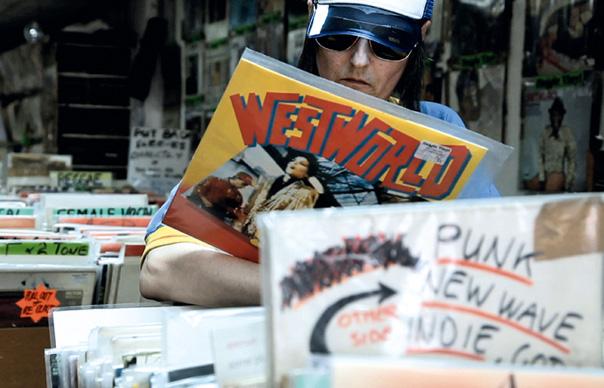The world of Lawrence is, by all accounts, a strange one. A singer once told me that, while visiting Lawrence at home, he was taken urgently by the need to use the lavatory. As the story was presented me, Lawrence flatly refused and the singer was forced to go outside to relieve himself. No one, it seems, uses the toilet chez Lawrence, apart from Lawrence. Lawrence is the idiosyncratic creative presence behind Felt, Denim and Go Kart Mozart, and the focus of Paul Kelly’s excellent documentary. Kelly – whose previous credits include assorted film projects for Saint Etienne, the band managed by his brother Martin – spent eight years with Lawrence for this film. It begins with Lawrence’s eviction in 2006 from a flat in Belgravia and ends on a more positive note, as Lawrence prepares for the release of the latest Go Kart Mozart album, On The Hot Dog Streets. As it is sympathetically presented to us here, Lawrence’s great tragedy is the chasm between his ambition and his commercial achievements. “I’m completely obsessed with being famous,” he admits drolly early on. “I crave it more than anything. The day I don’t have to go on the tube anymore is the day I fucking celebrate.” He admits Felt achieved much critically, but “commercially, it was a disaster.” He was “bitterly disappointed” Denim never broke through. “If I could just meet Kate Moss,” he sighs wistfully at one point. There is a deeper tragedy, too, beyond lack of a hit record: his homelessness and brief shots of methadone bottles worryingly signal a personal life in downfall. If there wasn’t a film crew around, you could be forgiven for wondering whether a concerned operative from the social services would put Lawrence on some kind of ‘at risk’ register. But let’s not look at this as a film about expectations thwarted, but rather take it as a celebration of Lawrence’s singular vision. After all, such is his dedication to his music that he breezily admits he has chosen “the group” over personal friendships. Such is his firm grasp on aesthetics, you can perhaps forgive his lack of understanding of how the real world functions. Michael Bonner
The world of Lawrence is, by all accounts, a strange one. A singer once told me that, while visiting Lawrence at home, he was taken urgently by the need to use the lavatory. As the story was presented me, Lawrence flatly refused and the singer was forced to go outside to relieve himself. No one, it seems, uses the toilet chez Lawrence, apart from Lawrence.
Lawrence is the idiosyncratic creative presence behind Felt, Denim and Go Kart Mozart, and the focus of Paul Kelly’s excellent documentary. Kelly – whose previous credits include assorted film projects for Saint Etienne, the band managed by his brother Martin – spent eight years with Lawrence for this film. It begins with Lawrence’s eviction in 2006 from a flat in Belgravia and ends on a more positive note, as Lawrence prepares for the release of the latest Go Kart Mozart album, On The Hot Dog Streets. As it is sympathetically presented to us here, Lawrence’s great tragedy is the chasm between his ambition and his commercial achievements. “I’m completely obsessed with being famous,” he admits drolly early on. “I crave it more than anything. The day I don’t have to go on the tube anymore is the day I fucking celebrate.” He admits Felt achieved much critically, but “commercially, it was a disaster.” He was “bitterly disappointed” Denim never broke through. “If I could just meet Kate Moss,” he sighs wistfully at one point.
There is a deeper tragedy, too, beyond lack of a hit record: his homelessness and brief shots of methadone bottles worryingly signal a personal life in downfall. If there wasn’t a film crew around, you could be forgiven for wondering whether a concerned operative from the social services would put Lawrence on some kind of ‘at risk’ register. But let’s not look at this as a film about expectations thwarted, but rather take it as a celebration of Lawrence’s singular vision. After all, such is his dedication to his music that he breezily admits he has chosen “the group” over personal friendships. Such is his firm grasp on aesthetics, you can perhaps forgive his lack of understanding of how the real world functions.
Michael Bonner



